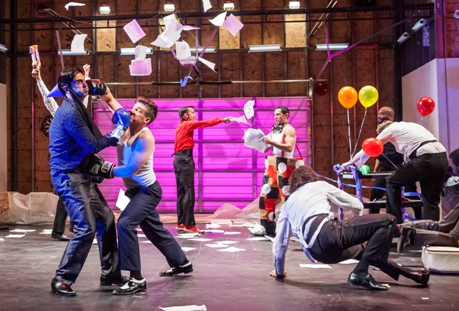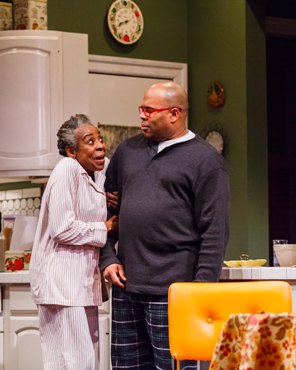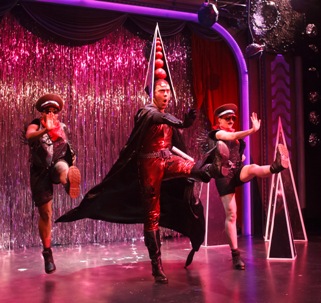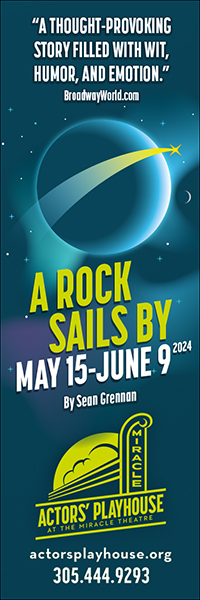 All hell breaks loose in The Glory of the World by Charles Mee at the Humana Festival of New Plays at Actors Theatre of Louisville / All photos by Bill Brymer
All hell breaks loose in The Glory of the World by Charles Mee at the Humana Festival of New Plays at Actors Theatre of Louisville / All photos by Bill Brymer
By Bill Hirschman
As before, the 39th annual Humana Festival of New American Plays last month seemed like one of those cornucopias of agricultural plenty. Some individuals might not like grapes, but adore peaches, or visa versa. Regardless, it’s hard not to be impressed with the overall quality and freshness of what spills out of the horn onto your table.
As always, the schedule encompassed intriguing works-in-progress that might end up on Broadway next season or at a South Florida theater. In fact, one of the ten-minute plays, Steve Yockey’s Joshua Consumed An Unfortunate Pear, bowed in a slightly different form last year in City Theatre’s Summer Shorts.
One comedy focused on the liberation of a 50s-something housewife, a drama was a mystical look at mourning and death in a small town, another took a serio-comic look at how matriarch’s dementia affects an inner city family, another was an outrageous fantasia mashing up science fiction with gay themes. Most memorable and divisive was the festival’s head-shaking finale, a 90-minute Charles Mee madness honoring the centenary of philosopher/monk Thomas Merton, which included a 15-minute tooth-and-claw melee bookended with what seemed like ten minutes of silence.
The festival is organized with an exemplary smoothness by Actors Theatre of Louisville a few weeks before the Kentucky Derby. Many of its works have gone on to national acclaim. Three have won the Pulitzer Prize: D. L. Coburn’s The Gin Game, Beth Henley’s Crimes of the Heart and Donald Margulies’ Dinner With Friends. Pulitzer finalists include Keely and Du by Jane Martin, Omnium-Gatherum by Alexandra Gersten-Vassilaros and Theresa Rebeck, and Becky Shaw by Gina Gionfriddo.
Much of the festival is staged in the Actors Theatre’s complex of three stages inside the renovation of a historic bank building featuring highly inventive, evocative and sometimes lavish settings enhanced with nimble advanced lighting and sound systems. It also brings in a cadre of some of the most skilled actors, directors and designers in the nation although few are household names. The considerable expense is underwritten by the health corporation’s foundation.
Under its second artistic director Marc Masterson in 2000 and especially under the current artistic director Les Waters since 2012, the festival has been pushing the boundaries of its offerings with experimental offerings and at least one way out-of-the-mainstream work, sometimes more. But they are always thought provoking, argument inducing and uniformly well-produced.
In fact, the scripts themselves run the gamut from polished to half-baked. But these usually are world premieres, meaning that they are works in progress, much as they were at Florida Stage. In exchange for the buzz of being among the first to see a professional mounting of the work, audiences must accept that many changes will likely be made in advance of other productions. For instance, everything we saw was 10 to 15 minutes too long, not from an ADHD standpoint, but from the standpoint that fat could be cut, even entire scenes.
In keeping with the evolving exploratory ethos, several shows suffer from a decidedly self-indulgent streak in which the author is allowed to ramble and the director is allowed to try off-the-wall repetitive staging. The most notable was last year’s John Henry, a breathtaking imaginative multi-disciplinary fable by directing guru Anne Bogart’s SITI group that unfortunately included a numbing central section in which the characters chased each other around in a circle for what must have been ten solid minutes accompanied by unrelenting pounding alleged to be music.
But here’s a snapshot of the works presented:
The Roommate, by Jen Silverman, has the most mainstream promise for its humor, insight, its theme of female empowerment and its ease of production as a single set, two-character work providing meaty roles for actresses over 50 years old. Sharon is an amiable but tentative hausfrau in small town Iowa who has just gotten divorced and is seeking a roommate to help her negotiate her unplanned-for freedom. Applying for the slot is Robyn, a vegan from the Bronx who seems unlikely to even be in Iowa let alone settling down in a community where the book club is the hot weekend ticket.
But the charming Robyn is slickly elusive about her past and what does slip out implies an unspoken darkness. To avoid spoilers, suffice it to say that Robyn is a free spirit who inveigles Sharon into diving into ever-more illegal adventures like a Pied Piper dangling “entrepreneurship” as a virtue. What sounds like a distaff Odd Couple or Thelma and Louise for the 21st Century actually is quite funny and touching on its own terms thanks to Silverman’s script, the direction by Mike Donahue and the performances by Margaret Daly and Tasha Lawrence, which, as with all performances at Humana, elevates the script several levels above its inherent quality.
A quick shout-out in case she Googles herself: Lawrence was the estranged wife when The Whale premiered at the Denver Center’s New Plays Summit a couple of years ago and then went with the show to New York. Her seven-minute scene melding love and fury was among the best performances I have seen in the past few years anywhere.
Dot, by Colman Domingo, has some buzz because the actor-dancer Domingo made a stir performing in The Scottsboro Boys and Passing Strange, but who has been evolving as a playwright for several years. This often jovial /sometimes chilling play depicts adult siblings returning to their once respectable but now deteriorating inner city home in Philadelphia. The home is still occupied by their mother Dotty whose mind has been deteriorating quickly but who has deceptively long periods of lucidity. The family gathers in the run-up to Christmas along with a family friend, a spouse and a caregiver. The tension mounts about how to divide up the responsibility of dealing with mom’s dilemma. The siblings include a gay writer, a driven lawyer and a ne’er-do-well video star now working as a store clerk.
This scenario is not ethnic-specific, but Domingo’s play certainly is with the family being African-American, the old friend and the spouse being white and the caregiver being Eastern European. Domingo and director Meredith McDonough created a familiar-feeling work a few cuts funnier than a stereotypical sassy sitcom on BET complete with whipsmart banter and a little darker than a Lifetime movie of the week. But the banter is infectiously amusing and every once in a while the carousel suddenly stops spinning when Dotty’s mind slips into the ether, lowering the temperature in the auditorium into the Kelvin scale.
Many observers complained that the lengthy work seemed too diffuse and scattered — committed to giving every character extensive time to tell their own story when the meat, even the humorous facet, is dealing with the mother’s dementia.
The actors were first-rate as they tried to rise above the sitcom characters and McDonough commendably moved the whole thing like a freight train speeding through a rural crossing at midnight.
I Promised Myself To Live Faster, is a “devised work,” meaning an entire theater troupe collaborates to create a theatrical piece, in this case, the Pig Iron Theatre Company of Philadelphia. This effort is a rollicking irreverent and downright loony mash up of Stars Wars, Charles Ludlam and scores of iconic pop culture memes.
It’s best just to paraphrase the program: Tim, a young gay black man, is summoned mysteriously to a very outré gay bar where an order of intergalactic nuns charge him with a quest: retrieve the Holy Gay Flame from the clutches of the evil emperor to save the race of Homosexuals and restore the balance of power in the universe. He is kidnapped by the nuns into an interstellar journey. But when he’s captured by the fabulously androgynous Ah-Ni, Tim’s chances look bleak.
The Bathhouse Bette script is absolutely hilarious with literally hundreds of puns, sight gags, witty epigrams and more dildos than you’ll find in a Hustler franchise. The production is meant to look like it was put together in someone’s garage with a glue gun, but it actually is more elaborate than it looks, including a flying Chinese dragon looking like that giant dog in The Neverending Story acting as a starship. A cast of five perform so many different characters in so many sparkling inventive costumes that the audience honestly assumes there are more actors.
Whether this can be replicated by another company somewhere is highly debatable (as is the case in most devised work), but this was an unadulterated tinsel-spangled hoot.
I Will Be Gone, by Erin Courtney, is an imagistic but a bit unfocused contemplation on mortality and mourning as members of a small town in Maine cope with increasingly mysterious happenings, ranging from ghosts to earthquakes, aggregating into something partly X Files, partly Twilight Zone. The play seems to center initially on a 17-year-old who has come to the town to stay with her aunt after her mother died. But everyone in the town seems haunted – her aunt, the mayor, the mayor’s wife, the town drunk, almost all of whom grew up together and share a history. Next to the town are the dilapidated remains of its predecessor, now a ghost town turned tourist attraction where the heroine gives tours.
In retrospect, the script makes more cohesive sense on the walk back to the hotel than it did while watching the production directed by Kip Fagan. Coming in without reading the Festival’s helpful notes in the Playbill, it was hard to identify the unifying theme.
The most assured element was the physical production in the round with doors and windows in the weather-beaten floor and a stage-sized model of the ghost town (like the town in Beetlejuice) lowered from the rafters every once in a while.
The Glory of the World, by Charles Mee, was performed several times during the month-long festival, but it also was the finale of the last weekend. All through the previous week, people asked, “Have you seen Glory?” and when you said, “Not yet,” they shook their head and said, “Well, it’s….something. I’ll be interested to know what you think.”
It’s hard to respond even now although it has stuck with me like peanut butter. Start with Mee, an acclaimed playwright who radically reconstructs familiar works like Greek classics into something specific to himself, often using off-beat collage-like structures and unique visions. Waters, who directed this piece, has collaborated with him on several others at the Humana Festival.
Even the premise of this play is unique. Thomas Merton was a philosopher, Trappist monk and activist who lived in Louisville during the 20th Century and had an epiphany on a downtown street corner currently marked by a plaque. Waters commissioned Mee to write about Merton — or at least his ideas – to honor the 100th anniversary of Merton’s birth.
The result has three segments. The central and largest piece is a modern-day birthday celebration by about 20-plus men of every age, ethnicity and background. They meet in what appears to be a cavernous empty warehouse section of a commercial storage unit. They begin wishing Merton a happy birthday and repeating some of his sayings. Their selections expose their own views of life, seeing Merton as an exemplar of everything from Catholicism to Communism.
Then for about an hour, they line up or pair off and utter an unending series of testimonial toasts that really indicate a huge variety of socio-political philosophies. Much of this period has the increasing drunken and rowdy individuals repeating pronouncements, all beginning, “In the words of…” and followed by some nuggets of wisdom, some profound and insightful, some wry or just plain silly from Pascal, Kafka, Ghandi, Christina Applegate and Cameron Diaz. A few are Merton’s thoughts, but probably not even half.
Over time, the men cart in a stunning array of disconnected flotsam from the storage unit next door until they have created a huge mancave playground with stuffed heads mounted on the wall, pool tables, etc. Their antics between testimonials gets wackier and wackier including a large rhinoceros crossing the stage and two guys sliding along a plastic sheet covered with spraying water. There is absolutely no rhyme or reason. None. And no visible connection to Merton.
And then it happens. Someone pushes someone and a fight breaks out. Like a bad western parody, eventually everyone gets pulled into the battle which escalates from fisticuffs to baseball bats to epees. The fight arranger deserved double pay at least, throwing in every move and every stunt he ever heard of. And it goes on for 15 minutes – a nearly unbearable eternity in stage time. The script itself suggests 15 minutes. The stage is left looking like a hurricane demolished everything.
All this begins and ends with a tall barefoot bearded man (Waters himself) walking onto a bare set, sitting in a chair with his back to us (is that ever apt) and staying motionless and silent. Nothing happens for quite a while. Then there are a few sounds. Finally, after a minute or two of silence, some nonsensical single line of out of context haiku – probably from Merton – is projected on the wall. Then another minute of dead silence. Maybe longer. ADD kicks in. Snickers. Fidgeting in the audience. People are afraid to leave for fear of appearing too intellectually unsophisticated to appreciate this “art.” Then another aphorism. Then more silence. This pattern goes on I’m guessing ten minutes. Which is a long time on stage. After the melee, Waters walks in (this time he faces the audience) and repeats the exercise for another ten minutes. And that’s the end of the play.
Many people in the audience were aghast as if they had watched a protracted automobile accident. Some were deeply intrigued and wandered out lost in contemplation. Some savored it as a lark and left elated. Some felt it was thought-provoking although I’d bet they could not articulate what those thoughts were with any specificity. Some felt that their good will had been taken advantage of – that this was arrogantly self-indulgent. If the object of some artists is to provoke a reaction, any reaction, Mee and Waters succeeded at that. Whether it was worth the Festival’s resources and the audience’s time, that is open to debate.
Miscellaneous: The festival also includes an evening of three short plays and a showcase for the theater’s extensive intern program in a series of short plays all tied to a central theme, this year being bluegrass music.
If you are interested in attending next year, the 40th anniversary, the dates stretching over about six weeks in March and April are pending. The last two weekends are designed especially with theater professionals in mind and attracts artistic directors, playwrights, actors and journalists looking “for the next big thing” and a chance to network over free buffets and a cash bar. The Actors Theatre of Louisville’s staff runs the sprawling monster with an efficiency that makes you wish they were supervising several state and federal agencies.
The real pleasure is the overwhelming feeling of being in the same rooms all weekend with hundreds of intelligent creative people who love what you love.
Louisville, too, is a fine town to visit, with lovely vistas of the Ohio River doing a fine imitation of the Mississippi, the extensive Muhammad Ali Museum honoring a favorite son, a classic paddlewheeler ride, omnipresent reminders of the Kentucky Derby down the road and the Louisville Slugger factory, plus a religious devotion to bourbon from specialty bars to distilleries to you name it,
For more information visit, http://actorstheatre.org/humana-festival-of-new-american-plays/









 A PaperStreet Web Design
A PaperStreet Web Design
